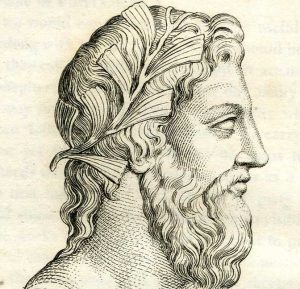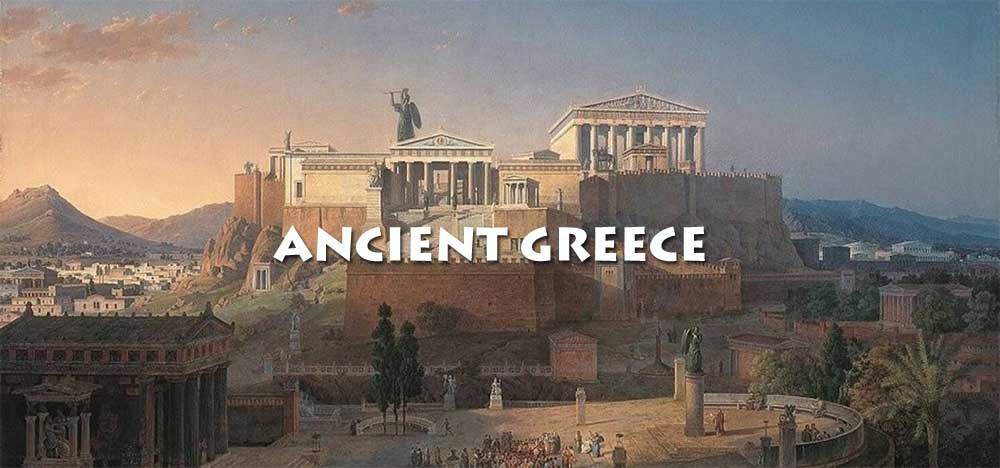Theocritus, Father of Pastoral Poetry
 Theocritus, who lived from around 310 to 250 BC, was an ancient Greek poet, often considered the creator or at least the earliest famous practitioner of pastoral poetry. His work had a profound influence on later literature, particularly on Roman poets such as Virgil and on the pastoral tradition in Western literature. Here’s a detailed overview of his life, work, and contributions:
Theocritus, who lived from around 310 to 250 BC, was an ancient Greek poet, often considered the creator or at least the earliest famous practitioner of pastoral poetry. His work had a profound influence on later literature, particularly on Roman poets such as Virgil and on the pastoral tradition in Western literature. Here’s a detailed overview of his life, work, and contributions:
The exact details of Theocritus’s life are sparse and somewhat speculative. He was believed to have been born in Syracuse, Sicily, or possibly on the island of Cos. The historical context of his life was a period of significant political and cultural change, following the conquests of Alexander the Great and during the Hellenistic Age, a time when Greek culture spread throughout the Mediterranean and Near East.
Literary Work
Theocritus is most famous for his Idylls, a collection of short pastoral poems that idealize the simplicity and beauty of rural life, featuring shepherds and rustic landscapes. The term “idyll” itself, meaning “little picture” in Greek, reflects the picturesque and often idealized scenes depicted in these poems.
In total, there are 30 poems traditionally attributed to him, though the authorship of some has been disputed. One of his most famous pieces is “Idyll 1,” where he introduces the genre by depicting a singing competition between two shepherds. This work showcases Theocritus’s ability to blend rustic settings with sophisticated literary techniques.
In “Idyll 7,” Theocritus explores the theme of unrequited love through the story of Polyphemus pining for Galatea. His nuanced portrayal of emotions and relationships brings depth and humanity to these mythological characters.
“Idyll 11”, also known as “The Harvest Feast”, celebrates the joyous festivities surrounding the harvest season in Sicily. Through vibrant descriptions and lively dialogues, Theocritus captures the essence of communal celebrations in ancient Greece.
Pastoral Poetry
His poems often feature dialogues between shepherds who compete in singing matches, an element that would become a staple in pastoral literature. Theocritus’s pastoral characters, environments, and themes were drawn with a charming realism mixed with idealized landscapes, creating a compelling and influential blend of nature and human emotion.
Urban and Mythological Themes
Not all of Theocritus’s work is pastoral. Some of his idylls deal with urban life, love, and mythological themes, showcasing his versatility as a poet. For example, Idyll 15, known as “The Festival of Adonis,” is set in Alexandria and provides insights into the cultural and religious life of the Hellenistic period.
Influence and Legacy: Theocritus’s work greatly influenced later poets, most notably Virgil in his Eclogues. His portrayal of rural life as an idyllic, peaceful retreat from the complexities and corruptions of urban existence was a theme that resonated through the ages, influencing Renaissance literature and beyond.
Style and Technique
Theocritus’s poetry is characterized by its vivid imagery, lyrical beauty, and the skillful use of dialects. He wrote primarily in the Doric dialect, interspersed with terms and phrases from other Greek dialects, adding a rich and authentic texture to his work. His ability to capture the nuances of spoken language, along with his keen observation of nature and human emotion, set his work apart.
Historical Context
Theocritus lived during the Hellenistic period, a time of cultural flourishing and cross-pollination following the conquests of Alexander the Great. This era saw the rise of new kingdoms and the spread of Greek culture across a vast area, from the Mediterranean to the borders of India. Theocritus’s work reflects the cosmopolitan nature of this age, incorporating elements from various Greek regions and even beyond.
Impact on Ancient Greek Literature
Theocritus’s impact on Ancient Greek Literature cannot be overstated. His innovative approach to poetry introduced a new genre, the pastoral idyll, which focused on rural life and showcased the beauty of nature. This departure from traditional epic poetry paved the way for other poets to explore themes of everyday life and human emotions.
His vivid descriptions of landscapes and characters brought a sense of realism and authenticity to his work, influencing future generations of writers who sought to capture the essence of daily existence in their own literary creations. Theocritus’s use of dialects and voices added depth and richness to his poems, setting a precedent for experimentation with language in literature.
By elevating scenes from rustic settings into poetic masterpieces, Theocritus challenged the conventional boundaries of storytelling and inspired others to push creative boundaries. His influence can be seen in works by Virgil, Ovid, and later poets who drew inspiration from his pastoral themes and lyrical style.
Influence on Modern Literature
Theocritus, often hailed as the father of pastoral poetry, continues to exert a profound influence on modern literature. His vivid portrayal of rural life and themes of love, nature, and human emotions have inspired countless writers over the centuries.
Authors like John Milton drew inspiration from Theocritus’s idyllic landscapes in their works, infusing their poetry with echoes of his pastoral imagery. Even in contemporary literature, traces of Theocritus’s influence can be found in the writings of poets who seek to capture the beauty and simplicity of rural existence.
His innovative use of dialogue and monologue has also left a lasting mark on literary techniques used by modern playwrights and novelists. By weaving together elements of realism with poetic language, Theocritus paved the way for future generations to explore new forms of expression.
Through his timeless themes and lyrical style, Theocritus remains a beacon for writers seeking to connect with nature and evoke deep emotions through their words. His legacy lives on in the hearts and minds of those who continue to find solace and inspiration in his enchanting verses.
